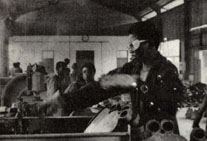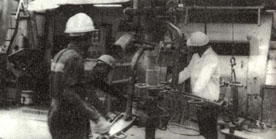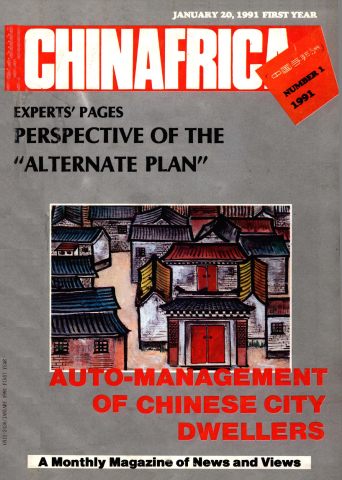The “structural adjustment” programme drawn up by the International Monetary Fund (IMF) and the World Bank after the pattern of Western industrial countries has failed to achieve success. As African countries are striving to strengthen their own macro-economic management and to unite as one to promote the quick establishment of a new international economic order, it is quite likely that the African Alternative Framework to Structural Adjustment Programme will work.
The economic reform and the structural adjustment programme devised by the World Bank and the IMF for African countries has been put in effect for 10 years. Although different statistical methods and points of view may affect one’s judgement on the results of the structural adjustment, one thing is quite obvious: reform and structural adjustment have paid a heavy social price while obtaining little results in economic recovery and efficiency increase.
The “Structural Adjustment” Programme
Let’s review the circumstances that led to the creation of the structural adjustment programme. The late 1970s and the early 1980s were marked by a long world economic recession. The disadvantages of a direct intervention by governments in the economy came to light. As a consequence, the conservative neoclassical theory mixed with monetarism and neoliberalism was held in high esteem by the Western world, especially by Britain and the United States. The “Thatcher Revolution” and “Reaganism” characterized by privatizing state-run enterprises and reducing public welfare expenditures enabled Western economy to achieve a long-term sustained growth. Thereafter, Western economists regarded the neoclassical theory as a good method to tackle economic problems. They applied this theory extensively to the economic adjustment and reform of underdeveloped countries. However, they overlooked a basic problem: to put the neoclassical theory into practice required a healthy market system, where goods and information are transmitted very quickly. The major components of the market, enterprises and consumers, usually react quickly to the supply-and-demand situation, including the fluctuation of interest rates and prices, and make correct decisions to achieve the rationalization of resource allocation. This system entails a normative market where the government acts as the market organizer and regulator. At the same time no interest groups can monopolize the market through non-economic means, make illicit profits, or hamper the rationalization of resource allocation.
However, such a “healthy” and “normative” market does not exist at all in Africa. Features of the African market are as follows: 1. The Africans have a poor commodity economy and a weak market consciousness.
2. Africa’s degree of non-monetization of products ranks first in the world.
3. The market has a dual structure. Most African countries’ economy has a dual nature with both modern and traditional factors. It finds its expression in the coexistence of both a modern and a traditional market—the coexistence of a developed commodity-money relationship with an underdeveloped market.
4. It is extremely difficult to establish a free price system in Africa. Because of poor economic standards, market exchange products are not varied and substitute goods are always in short supply. In order to meet the people’s needs and maintain social stability, local governments usually exert price controls. Therefore, the price seriously deviates from what it really should be.
5. The economies of African countries are too closely linked with the international market. In Africa, many monetary establishments are branches of the international banking institutions. African governments have not exercised effective control over these establishments while local national banks are usually too weak to match them.
6. Market performance is not standardized enough in Africa. This has to do with the governments’ failure to work out effective policies and regulations and act as organizers and supervisors of the market. It is also related to Africa’s political and social environment.
7. Unreliable transport and a poor communication system are common in Africa. Because of this, African people, with the exception of city dwellers, are very slow in reacting to price fluctuation.
To sum up, the African market is not a “healthy” or “normative” one. In Africa, the price information is usually transformed and its positive effect twisted while the negative effect is expanded. Therefore, the structural adjustment programme by the World Bank and IMF was carried out successfully in Western developed countries but was a total failure in Africa.
Reasons for the Failure
The structural adjustment programme of the World Bank and the IMF can be divided into three parts: 1. Economic retrenchment and reduction of public spending to cut down the financial deficits and improve the international revenue-expenditure situation; 2. Easing the governments’ direct control of the economy and advocating privatization; and 3. Adopting various price policies including exchange rate, interest rate and the elimination of price control to make the price reflect supply-and-demand relations. The purpose of these measures was undoubtedly to build up a sound mechanism, under which the government controls and regulates the market while the market guides the enterprises. From this aspect, the programme was beneficial to Africa. After all, it was just an option. But the results from the implementation of these specific policies are open to doubt.
As far as privatization is concerned, private capital is small in Africa and capitalists have no managerial skills. They are unable to act as independent dealers with equal competitiveness or to help rationalize the allocation of resources. Trade liberalization has killed the small industry. The reform of price policies also failed to achieve the desired results. In the African countries who implemented the reform, the increased interest rates not only pushed up production costs but also failed to stimulate the increase of savings deposits as expected by the World Bank and the IMF; on the contrary, it sometimes encouraged financial speculation. Although devaluation of the exchange rate has produced certain positive effects, namely on the production and export of agricultural products, it has seriously affected the industry, especially the manufacturing industry. The normalization of product prices—to ease or eliminate price control—has resulted in inflation rather than output growth.
The analysis concerning African economic problems in the structural adjustment programme indeed embodied some positive points. For instance, the programme believed that, if Africa had a perfect market economic system adjusted and controlled indirectly by governments, the economic problems could be resolved, thus laying a foundation for long-term development. But the programme copied the patterns of economic adjustments for Western industrial countries. As a result, it failed to obtain the expected results. The reason is that in Western countries, the market system is healthy and the governments’ minor role is aimed at giving full play to the market and easing conflicts between government and market. But in Africa, to stop all direct interference by governments in the market would cause serious confusions in economic activities. It is therefore apparent why the World Bank’s reform programme failed.
The African Alternative Framework to Structural Adjustment Programme
The structural adjustment programme has fallen short of its expectations. How should Africa carry out its reform and adjustments? In April 1989, the Economic Commission for Africa (ECA) issued a report entitled the” African Alternative Framework to Structural Adjustment Programme.” The report held that Africa’s economic setup of production, exchange and consumption is the major cause of Africa’s underdevelopment and retrogression. In order to considerably improve the standards of living and ensure the well-being of the people, it needs to transform the single-product economic structures. For this purpose, the ECA came up with a thorough framework of policies, characterized by: (1) Practising a dual rate system; (2) Limiting service rate; (3)Guaranteeing the supply of necessary commodities by selectively providing subsidies and controlling prices to maintain social stability;(4) Reducing defence and non-productive government expenditures and increasing social welfare expenditures for cultural, educational and public health sectors; (5) Practising, to a limited degree, a deficit financing policy to meet the need for infrastructural construction and productive investment; (6) Selectively carrying out a trade control policy and exerting control of import of luxury goods; (7) Expanding public participation in policy-making.
The alternative plan stressed that governments should strengthen direct intervention in the economy and attach greater importance to improving social welfare, education and public health. The programme has been criticized by developed countries and international organizations as interventionism, unadapted to world trends.
Is the alternative programme feasible? To reply this question, we should first evaluate whether direct intervention by governments in economic activities are necessary. In the early years after independence, African countries faced a economic situation characterized by extremely poor productive forces, low national income, inadequate capital, restricted market, little participation of Africans in modern economic sectors—almost nil in industrial sectors—poor performance of the private economy, weak economic structures, heavy dependence on international market, and a disproportionate distribution of income. By intervening directly in the economy, most African governments hoped to develop the basic industrial sectors with long-term investments, poor profits and great risk and accelerate fund accumulation. They also hoped to improve African managerial and administrative skills and increase the state revenue to enable every resident to equally share the fruits of the economic development.
However, the past 20 years probably disappointed Africans. Direct intervention by government in the economy failed to quicken the economy’s development and the people’s standard of living barely improved. On the contrary, there appeared problems such as inefficiency, rigidity and corruption of managerial personnel. Therefore, it was natural that people began to doubt the benefit of government intervention in the economy.
The question is, can problems such as inefficiency and rigidity be overcome if government intervention is eliminated? Is it certain that state-run enterprises are doomed to inefficiency? The answers to these two questions are negative. The problem of inefficiency in state-run enterprises is a problem of management. Once the management and workers show great concern for their enterprise assets, the level of efficiency can be raised. This has been confirmed by experience in many developed and developing countries. The township industrial development in China over the past decade also indicated that there are no direct relations between the form of ownership of enterprises and operational situations. In Africa, the elimination of direct intervention by governments in economy—that is, practising privatization and liberalization—may result in heavy losses for individuals and society because of the performance of producers and consumers, and cause the shortage of common products. It may also seriously widen the gap between rich and poor and bring about social turmoil. Therefore, the answer to whether governments in Africa should take various means to intervene directly in the economy should be positive because the objective demand for such an intervention still exists. But, of course, the direct intervention by government should be moderate and gradually reduced while measures of indirect regulation should increase.
Feasibility of the Alternative Programme
Proceeding from the above analysis, in theory, the alternative programme is basically feasible because it conforms to Africa’s present economic structures. At the same time, it has drawn lessons from the structural adjustment programme which over-emphasized liberalization and neglected social welfare. But in the course of practical implementation, the programme may encounter many difficulties. First of all, international organizations and developed countries have a negative attitude towards the programme. To carry out the programme, African countries not only have to reschedule the serving of their debts but also require the introduction of a large amount of foreign investments. Therefore, the understanding and co-operation of the international community would be of great importance. The second impediment originated from African countries themselves. First, the low level of managerial expertise is a major obstacle. The direct intervention by government requires that governments have the latest information about the economic situation and the government ministries have high managerial skills. Second, the sound economic operation requires a favourable political and social environment. Economic policies will be worked out and practised successfully, so long as the governments of African countries can prevent the interest groups from using administrative measures to gain illicit profits or cling to their vested interests, firmly crack down on corruption, and meanwhile bear in mind at all times that the purpose of their policies is to improve the welfare of all people. Otherwise, they will dampen the enthusiasm of the majority of people who are willing to take part in the reform. Without the support and participation of the people, the success of the programme is uncertain.
Africa’s economic difficulties are caused to a great extent by external factors. To overcome these difficulties, outside conditions have to change. For instance, Western countries who held direct responsibilities for these difficulties should increase their aid to African countries with no conditions, reduce or cancel certain debts, earnestly support African countries in their efforts to invigorate their economy, and establish a new international economic order as soon as possible.
The Alternative Programme has been worked out by African countries in the light of their own conditions. So far as the African countries themselves are concerned, provided that they spare no efforts to implement their reform and enhance their macro-economic managerial expertise, unite as one and promote the establishment of a new international economic order, it is my belief that the economic rejuvenation and development in Africa will be full of promises for the next decade to come.
*The author works at the Institute of West Asian and African studies in Beijing.

Hoes are cooled down after firing in a Tanzanian factory. XINHUA

Nigerian technicians at work in a oil refinery. XINHUA


 Copy Reference
Copy Reference 